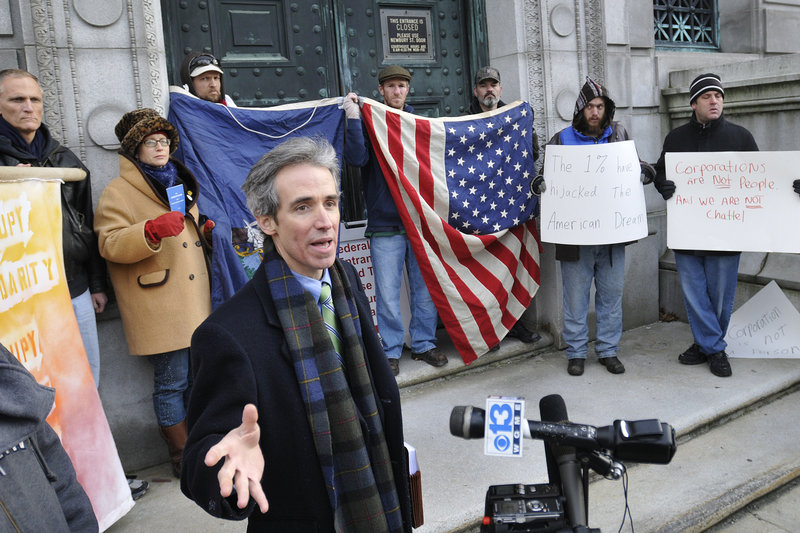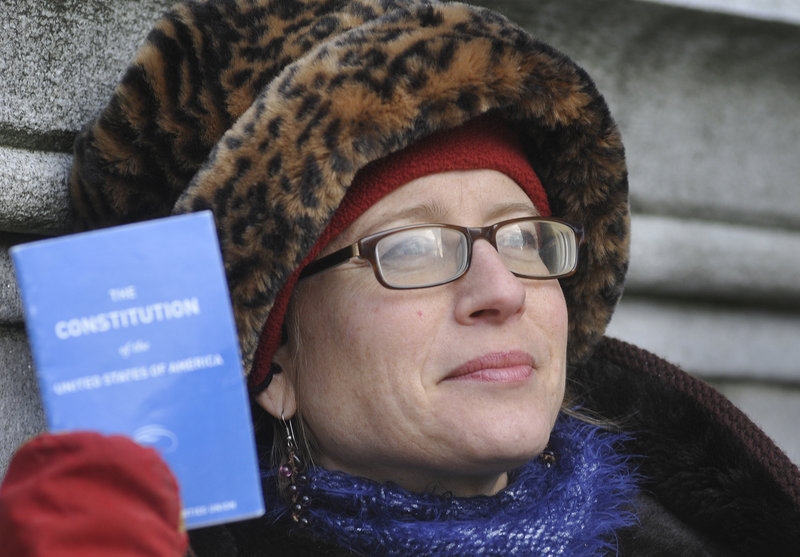PORTLAND – Occupy Maine says the state constitution gives protesters camping in Lincoln Park some rights beyond those provided by the federal Constitution.
As it had promised, the group sued the city Monday, arguing that rules about the park’s use and the City Council’s denial of a permit for the encampment violate the protesters’ rights.
The lawsuit was filed in Superior Court, where issues regarding the federal and state constitutions can be addressed. It would be the first Occupy case to be decided under a state’s constitution.
Occupy Maine and the four individual plaintiffs in the lawsuit are relying on the rights provided in the state constitution to defend their position, John Branson, the group’s lawyer, said during a news conference on the steps of the Cumberland County Courthouse.
Among the sections of the state constitution he cited was one that gives people the right to consult upon the common good.
“If you don’t have the ability to maintain a sustained presence and community as they do in Lincoln Park, I don’t think that right means anything. If you have to clear out at 10 o’clock at night, you can’t have the kind of conversation that’s going on in Lincoln Park, which is one of the most amazing conversations I’ve ever been part of,” Branson said.
The filing allows the encampment to remain. Occupy Maine and city officials agreed that the protesters will not have to leave while the case is in litigation.
With their lawsuit, the protesters in Portland have joined the many Occupy groups that have taken their disputes to federal or state court.
No case is roughly comparable to Occupy Maine’s because each case deals with particular municipal restrictions and, possibly, a specific state’s constitution, said Zachary Heiden, legal director of the ACLU of Maine Foundation. The organization filed a friend-of-the-court brief in support of Occupy Maine.
While the U.S. Constitution deals with the rights of Congress to restrict speech, Heiden said, Maine’s Constitution speaks of the affirmative right of speech.
“Some justices of the Maine Supreme Judicial Court over the years have said maybe this is a stronger protection, this goes beyond what the federal Constitution protects,” Heiden said. “We hope that’s what the courts will say in this case.”
Berney Kubetz, a Bangor-based lawyer with a specialty in First Amendment issues, said the state constitution is more affirmative, but he doesn’t believe it will provide a lot of traction for Occupy Maine.
“If I were representing the movement, I would probably cite it and suggest it goes way beyond the federal Constitution in its grant of power to the people…. But I don’t really see it having a lot of teeth a judge would grab on to and say, ‘Aha, this is the basis on which I would rule in favor of the movement,’ ” he said.
Courts have been looking to a 1984 U.S. Supreme Court case – Clark v. Community for Creative Non-Violence – when considering Occupy cases, said Dmitry Bam, a professor at the University of Maine School of Law.
In that case, the court found that protesters did not have the right to sleep in national parks, and that the restriction was reasonable and not based on the content of the group’s activity.
The nationwide Occupy movement, protesting economic inequality, has faced the challenge of showing that restrictions the groups face are not content-neutral, Bam said. That could require protesters to prove that the intent is discrimination.
“The ideal smoking gun would be an email that says, ‘I’m tired of these people expressing their views or their anti-corporate views,’ ” he said.
In its complaint, Occupy Maine asserts that Portland’s ordinance banning people from Lincoln Park between 10 p.m. and 6:30 a.m. constitutes a blanket ban on speech and assembly during those hours.
The group argues that the restrictions are inherently overly broad and are applied unfairly to the protesters, whose expression relies on sustained, continuous assembly in a public space.
Another rule, requiring advance permission for gatherings of more than 25 people or more than three days, is unconstitutional, the complaint argues.
The group also contends that the City Council violated Occupy Maine’s constitutional rights earlier this month when it denied the group a permit to stay in the park. Occupy Maine argues that city officials could have granted waivers or variances as it does to commercial interests, but denied the permit based on the group’s activities and message.
Branson said Occupy Maine is unusual in that it sought permission from the city and never denied that Portland has a right to regulate the group’s continuous assembly.
“We were invited here,” Branson said. “The city manager recognized this as First Amendment activity from the start.”
Jonathan Piper, a Portland-based First Amendment lawyer, said Occupy Maine may have a stronger argument because it did try to work through the permitting system.
“It’s like, most municipalities have a parade permit. You can’t just have a mob run down the middle of the street. But if you say, ‘At 12 o’clock noon, to celebrate this or protest that,’ ” then the city would have to show good reason why you can’t be issued a permit,” Piper said.
The city has 21 days to respond, then Occupy Maine will have a week to reply. A hearing could then be scheduled.
Nicole Clegg, a city spokeswoman, said it is too early to respond to Occupy Maine’s legal argument.
“The legal team’s all starting to review it,” she said, and the timing of the city’s response will depend on the complexity of Occupy Maine’s complaint.
Staff Writer Ann S. Kim can be contacted at 791-6383 or at:
akim@pressherald.com
Send questions/comments to the editors.




Success. Please wait for the page to reload. If the page does not reload within 5 seconds, please refresh the page.
Enter your email and password to access comments.
Hi, to comment on stories you must . This profile is in addition to your subscription and website login.
Already have a commenting profile? .
Invalid username/password.
Please check your email to confirm and complete your registration.
Only subscribers are eligible to post comments. Please subscribe or login first for digital access. Here’s why.
Use the form below to reset your password. When you've submitted your account email, we will send an email with a reset code.